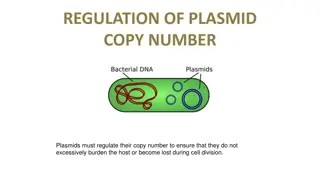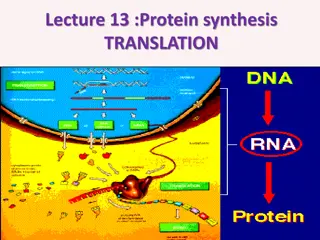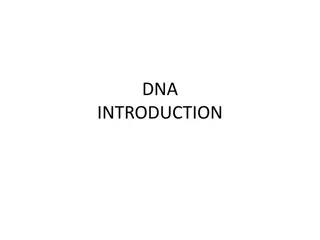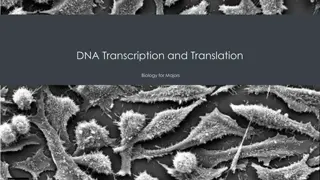REGULATION OF PLASMID COPY NUMBER
Plasmids regulate their copy number to maintain a balance that doesn't burden the host cell. Copy numbers vary based on factors like plasmid size and culture conditions. Plasmids are classified as stringent or relaxed based on replication control. Various systems, including counter-transcribed RNAs
4 views • 17 slides
An Overview of Cell Biology: From Cytology to Modern Studies
Cell biology, also known as cytology, explores cells from various perspectives including physiological, developmental, and evolutionary aspects. Modern Cell Biology delves into the mechanisms of metabolism, heredity, and evolution at the molecular level, involving proteins, RNAs, and DNA. The compar
0 views • 13 slides
Understanding Protein Synthesis and Translation Process
Proteins play a crucial role in various body structures and functions. The process of translation, as per the central dogma, involves converting genetic information from DNA to functional proteins through transcription and translation. This process includes initiation, elongation, and termination st
1 views • 25 slides
Understanding DNA: A Journey from Friedrich Miescher to Genes and Function
DNA, the hereditary basis of life, was first discovered by Friedrich Miescher in 1869. It consists of chromosomes, plasmids, and organellar DNA, collectively known as the genome. Genes, sequences of DNA, encode proteins and RNA, essential for an organism's functions. The genome is divided into chrom
0 views • 17 slides
Understanding DNA Transcription and Translation in Biology
DNA transcription is the process where DNA is used as a template to create mRNA in the nucleus. This mRNA is complementary to the DNA and goes through initiation, elongation, and termination stages. RNA polymerases are essential for this process in eukaryotes. Various RNA polymerases have specific f
0 views • 47 slides
Understanding Cauliflower Mosaic Virus: Structure, Reproduction, and Genome
Cauliflower Mosaic Virus (CaMV) is a plant virus studied by Assistant Professor Kavita Basumatary at Goalpara College. The virus has a circular, double-stranded DNA genome of about 8000 bp in length with unique discontinuities. Reproduction involves the viral genome entering the host cell nucleus, w
0 views • 6 slides





